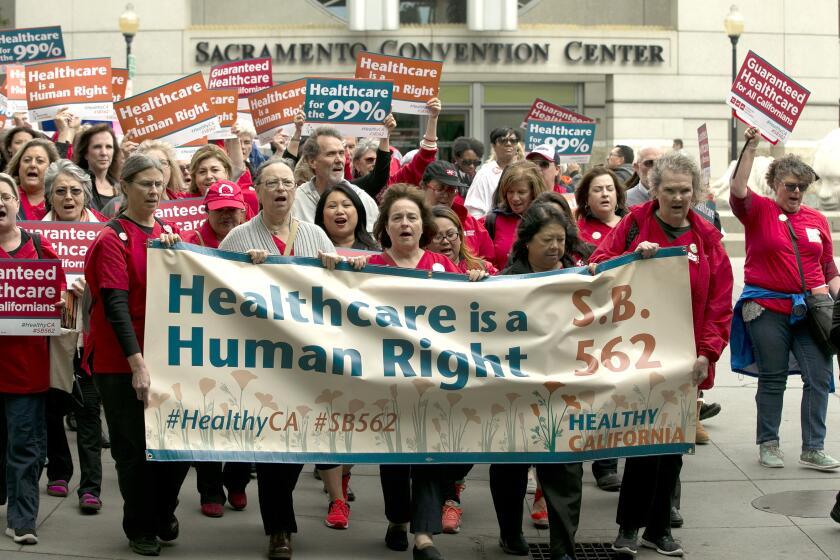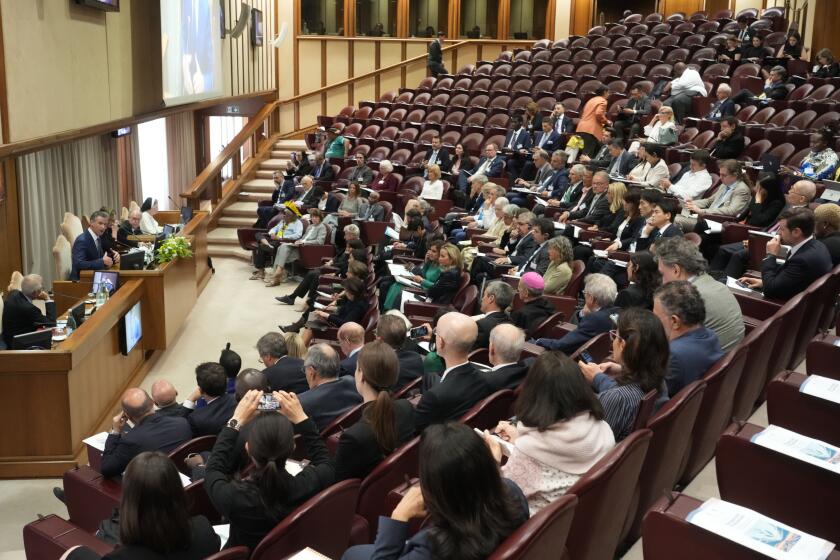Propositions, Amendments and Babies
She sat in a blue plastic chair, waiting her turn at the Pacoima Community Health Clinic. Elvia’s baby, her second child, isn’t due until April, but already her girth strains the fabric of her blouse. A button is missing at her breast. To compensate, she employs a lapel pin--a tiny American flag.
Elvia is a native of Mexico who illegally immigrated to the United States several years ago. She’s quick to point out that her Mexican husband is here lawfully and she has some paperwork pending at the INS.
Even so, she knows most California voters apparently wish she’d stay away from this public health clinic. She is here because enforcement of Proposition 187, despite its overwhelming approval, has been delayed by the courts. But above all else, Elvia is at this clinic because she wants her baby to be healthy.
It’s a virtual certainty that Elvia’s child will be born on U.S. soil and will therefore be an American citizen. The 14th Amendment doesn’t care about the mom’s immigration status; it just cares about the baby. Still, a large majority of California’s voters--though, incidentally, not nearly enough to pass a school bond measure--think Elvia and her unborn baby shouldn’t be entitled to the care accorded America’s poor or its legal immigrants. Voters are right in defending the principle that people should not benefit from illegal acts. Then again, unborn children aren’t usually considered criminals.
But let’s try to strip away the emotions and philosophical quandaries of immigration. Today’s topic is prenatal economics--a picture that seems to be changing.
Just a few years ago, before he hitched his reelection bid to Proposition 187, Gov. Pete Wilson believed an ounce of prevention was worth a pound of cure. Prenatal care fit snugly into Dr. Wilson’s moderate Republican prescription of preventive government.
Numerous studies backed him up, asserting that prenatal care ultimately saves money by decreasing the number of premature babies and other medical complications that result in astronomical hospital costs. California health authorities concluded the savings to be about 2 to 1, according to Irene Riley, chief of government relations for the Los Angeles County Department of Health Services.
So in the best spirit of a fiscal conservative, Wilson committed state funds to help pregnant women and their babies and to save the taxpayers greater costs down the road. Health professionals who applauded Wilson now say that 187, the governor’s new prescription, will result in more health problems and greater costs.
But now comes a new study that suggests that maybe those old studies were wrong, and that the savings of prenatal care were exaggerated. In a paper published Nov. 10 in the New England Journal of Medicine, researchers asserted that earlier studies were flawed. The researchers haven’t penciled in new estimates, but they say the assumption of great savings is a myth.
Look for this study to be touted as proof that prenatal care is a waste of taxpayers’ money, though that isn’t what the researchers concluded either. Indeed, the doctors who conducted this study are wary of how their report will be used politically. The doctors, wrote Gina Kolata of the New York Times, emphasized that “prenatal care is medically important and that all pregnant women should receive it.” One of the researchers told Kolata: “I don’t want this to be construed as an anti-prenatal-care article.”
The bottom line in health care economics is that it’s impossible to strip away the emotion. The ultimate question is the value of human life, and the market hasn’t yet succeeded in fixing a price tag, despite the best efforts of lawyers, insurance companies, courts and kidnapers.
A premature baby is very expensive; a stillborn child isn’t. What fate do you wish for Elvia’s child? For society at large, a healthy baby, or a sick baby who gets well, has the potential to be a benefit to society, not a burden, especially if he or she is allowed to go to school.
*
Angie Mejia has no doubt that prenatal care saves lives and money. A licensed vocational nurse at the Pacoima clinic, she counsels expectant mothers on their diets and warns them of folk remedies that contain lead, a potential cause of brain damage in their babies. She’s looked for signs of toxemia and other conditions that could result in expensive complications at birth.
The 187 champions argue that the measure will stop immigration and thus prevent Los Angeles from becoming the Calcutta of California, a Third World nightmare teeming with crime, disease and death. Angie sides with health care professionals and law enforcement authorities, who say the causes of disease, poverty and crime will be served by the denial of medical services and schooling, not vice versa.
Angie helped me interview Elvia. She is 30 years old and came to the United States in search of work. She’s cleaned houses and helped raise children, working for one family two years. Her husband, a sheet metal worker, rises at 5:20 a.m. to go to work. She’s up at 6 to get her 14-year-old son and her 13-year-old sister ready for school. Elvia’s mother, back in Mexico City, sent the teen-agers up a couple years ago. Their monthly household income is about $1,400, including the $300 they get from the boarder. Home is a two-bedroom apartment rented for $675 per month. The teen-agers have a bunk bed in the living room.
Elvia seemed to understand the voters’ resentment, especially the anger toward immigrants who commit crimes and join gangs. But she thinks decent people are being blamed too. Proposition 187, she said, won’t stop illegal immigration. Americans, she suggested, underestimate the desperate conditions that immigrants face back home.
“They’re always going to be coming. Even though they take us out of here, we’ll still come back,” she said, “because they want a better life.”
Elvia says she’s glad her child will be born an American.
Of course, many people think her baby isn’t worthy, since mom’s an illegal immigrant. That’s why a movement is afoot to close the illegal immigrant loophole created by the 14th Amendment. That amendment was adopted after the Civil War, affirming that quaint American notion that “all men are created equal.” (We later figured that meant women too.)
It’s a great topic for another time.
Scott Harris’ column appears Tuesday, Thursday and Sunday.
More to Read
Get the L.A. Times Politics newsletter
Deeply reported insights into legislation, politics and policy from Sacramento, Washington and beyond. In your inbox three times per week.
You may occasionally receive promotional content from the Los Angeles Times.






